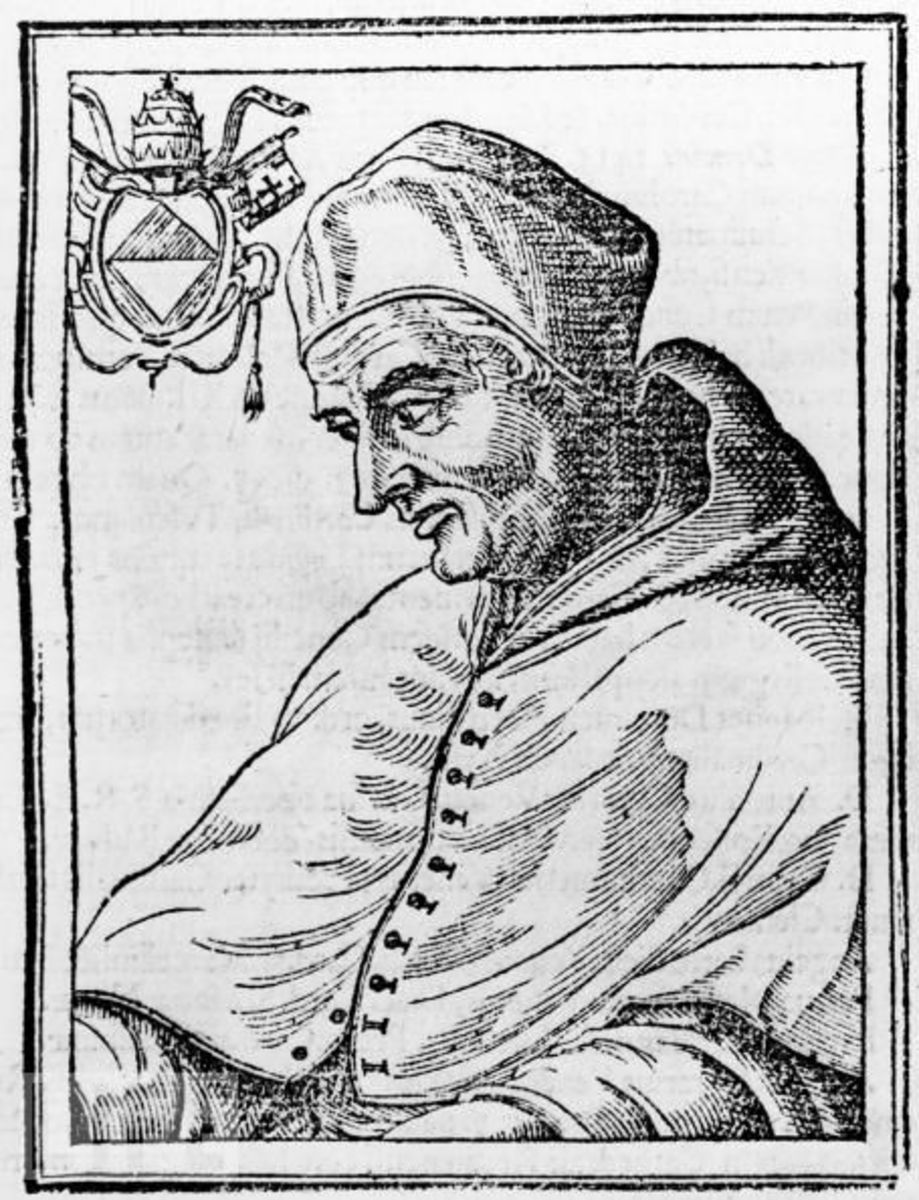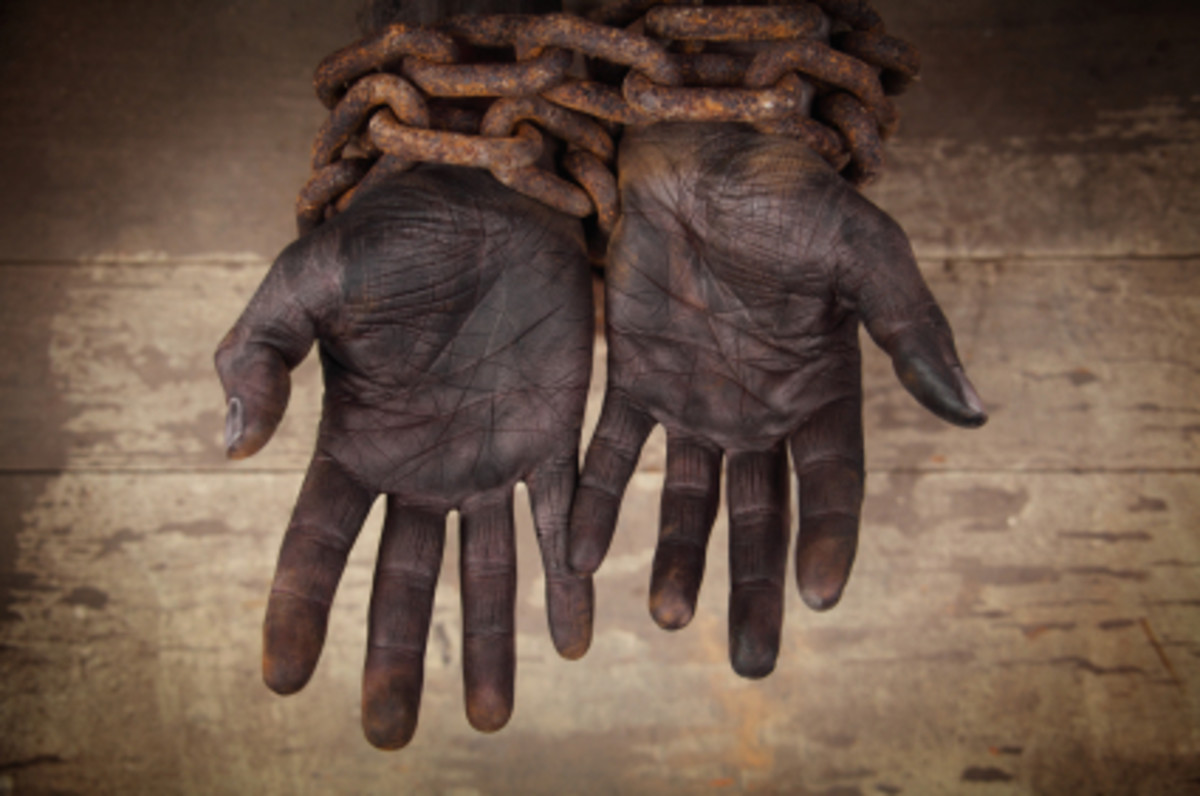Reading is Fundamental to Freedom and Liberty
Figure 1
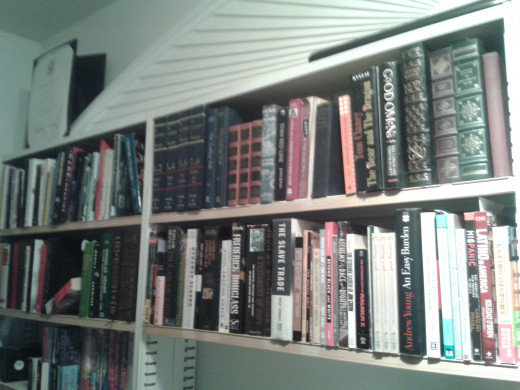
Reading is Fundamental to Freedom and Liberty
On a slow Sunday afternoon I was squirreled away in my library (a modest accumulation of books) trying to decide what my favorite book was. I have several pieces that I go back to all the time and cited in my own simple writing exercises. While there are works of fiction in the collection, the majority are non-fiction focusing on the subjects of economics, political theory, science, and philosophy. As such I found it interesting that one of the books that rose above the rest was a play written in 1951. Inherit the Wind[1], by Jerome Lawrence and Robert E. Lee, was based on the 1925 court trial of The State of Tennessee v. John Thomas Scopes, where a schoolteacher (Scopes) was accused of violating Tennessee (TN) law by teaching evolution in a public school classroom. The setting for the play is a small fictional southern town of Hillsboro where the actual case was heard in DaytonTN.
I keep coming back to this play because of the manner in which it explores an often-misrepresented issue. The commonly people perceive the conflict is as a battle between the belief in the Bible (religion) and science. The issue is far more complex, it is an attempt to exercise absolute control over human thought. Limiting access to competing information has the effect of extinguishing curiosity about conflicting beliefs thereby restricting the tolerance of others. Reading is the foundation to a more extensive understanding beyond the confines of oral or localized history. Any society that claims as a founding principle a belief in individual freedom and liberty should never get to a place where the citizens fear reading a book and/or publicly discuss it.
Figure 2
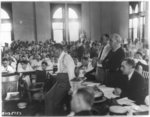
The Trial and Play
To understand the premise of the play, it helps to have a reference point about the law and court case being portrayed. The following is an excerpt from the text of the TN statute, “Section 1. Be it enacted by the General Assembly of the State of Tennessee, That it shall be unlawful for any teacher in any of the Universities, Normals and all other public schools of the State which are supported in whole or in part by the public school funds of the State, to teach any theory that denies the story of the Divine Creation of man as taught in the Bible, and to teach instead that man has descended from a lower order of animals.” In short, evolution was illegal to teach in any publicly funded school. In 1925, TN was the first to enact a law of its kind; it was followed by Mississippi (MS) in 926 and Arkansas (AR) in 1928. No other state produce such a law, however, in 1999 the Board of Education in Kansas (KS) removed evolution as an education teaching standard. The concern that brought about the law was the fear that presenting an opposing view to evolution would diminish a person’s faith in God. While it had not been enforced in years, the TN statute was not removed from the law books until 1967. Mr. Scopes was a High School Science teacher who used the textbook Civic Biology by William Hunter in his class. He was aware that using this particular textbook was a violation of the law.
In the original jury trial, Mr. Scope’s was found guilty of violating the law and the judge imposed a fine of $100.00. The conviction was appealed and finally heard by the TN Supreme Court, where the conviction was overturned. The ruling was not based on the constitutionality of the law. It was found that the trial judge had made a procedural error in leveling a fine of $100.00. At that time in TN any fines over $50.00 had to be issued by a jury. In writing the opinion of the Court, Chief Justice Green sounded as if he was trying to finish off the case as quickly and quietly as possible. “We see nothing to be gained by prolonging the life of this bizarre case. On the contrary, we think the peace and dignity of the State, which all criminal prosecutions are brought to redress, will be better conserved by the entry of a nolle prosequi herein. Such a course is suggested to the Attorney-General.” (Scopes v State of TN) While the play is a piece of fiction, it does a very good job of capturing the spirit of the original trial by showcasing the conflict between the two sensibilities.
One of the more confrontational scenes happened near the end of the play, after the two legal titans had been locked in a verbal test of skills and will. Brady is the lead lawyer representing the State, Davenport is the circuit district attorney and Drummond is council for the defense. Since the Judge has barred the defense from calling expert witnesses on evolution, Drummond calls on Brady to testify as an expert on the Bible. The following exchange occurs after Drummond challenges Brady’s interpretation of the Bible:
Davenport: I demand to know the purpose of Mr. Drummond’s examination! What is he trying to do?
Brady: I’ll tell you what he’s trying to do! He wants to destroy everybody’s belief in God!
Drummond: You know that’s not true. I’m trying to stop you bigots and ignoramuses from control the education of the United States! And you know it!
Drummond: The Bible is a book. A good book. But it is only a book. (Lawrence and Lee 98)
Many people will read this passage and conclude that the character Drummond (by extension the writers) was anti-religious and hated everything Brady stood for. However, the closing scene provides a different perspective into Drummond’s motivation. The next interaction is between Drummond and a reporter named Hornbeck after they had been informed Brady had died.
Judge: Brady’s dead.
Drummond: I can’t imagine a world without Matthew Harrison Brady.
Cates: What caused it? Did they say?
Hornbeck: Matthew Harrison Brady died of a busted belly….You know what he was: A Barnum-bunkum Bible-beating bastard!
Drummond: You smart-aleck! You have no more right to spit on his religion than you have the right to spin on my religion! Or lack of! (Lawrence and Lee 125)
Hornbeck commences to produce a hail of insults on how the world should remember Brady. The exchange ends with the reporter accusing Drummond of going soft on his opinion of Brady because he had just passed. To which Drummond responses with:
Drummond: Why? Because I refuse to erase a man’s lifetime? I tell you Brady had the same right as Cates: the right to be wrong! (Lawrence and Lee 125)
Drummond did not think less of Brady for holding an opposing view and he was not willing to judge Brady’s life time of work based on this single exchange. They disagree on a fundamental point, but part of Drummond’s argument throughout the trial was issues of contention need to be debated publicly and not silenced. The last scene that I am going to highlight is at the heart of the debate, which is promoting informed disagreement.
Drummond: Am I correct, sir, in calling on you as an authority on the Bible?
Brady: I believe it is not boastful to say that I have studied the Bible as much as any layman. And I have tried to live according to its precept.
Drummond: Bully for you. Now, I suppose you can quote me chapter and verse right straight through the King James Version, can’t you?
Brady: There are many portions of the Holy Bible that I have committed to memory.
(Drummond crosses to counsel table and picks up a copy of Origin of Species)
Drummond: I don’t suppose you’ve memorized many passages from the Origin of Species?
Brady: I am not in the least interested in the pagan hypotheses of that book.
Drummond: Never read it?
Brady: And I never will.
Drummond: Then how in perdition do you have the gall to whoop up this holy war against something you don’t know anything about? How can you be so cocksure that the body of scientific knowledge systematized in the writings if Charles Darwin is, in any way, irreconcilable with the sprit of the Book of Genesis? (Lawrence and Lee 85)
For Drummond the point that was infuriating was the lack of informed disagreement. Brady was defending a statue that outlawed a theory without reading or an attempt to understand the theory. Brady’s argument was based on emotion, without trying to understand the opposing point of view.
Figure 3
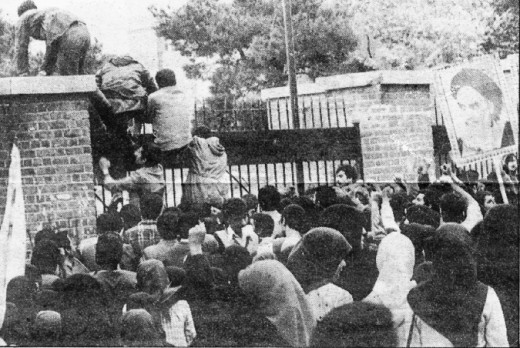
When Reading Becomes A Dangerous Proposition
Years after reading Inherit the Wind, I was given a copy of another intriguing book called Reading Lolita in Tehran, by Azar Nafisi. It is a nonfiction work set in the city of Tehran, Iran during the 1980s and early 90s. The memoir focused on a reading group put together by Dr. Nafisi with several former female students after resigning her position as a Professor of Literature at the University of Tehran. Many of the authors they were reading (Jane Austen, F. Scott Fitzgerald, Henry James, and Vladimir Nabokow) had been deemed by the government as unfit for consumption by the general population because they glorified immorality. The works were especially taboo for women read. Dr. Nafisi gives many example of the repressive state the country had become, especially for women. One of the disturbing episodes which captured the mood of the country happened to her young daughter at school.
“That day in the middle of her last class—science—the principle and the morality teacher had barged in and told the girls to put their hands on their desks. The entire class had been escorted out of the classroom, without any explanation, their schoolbags searched for weapons and contraband: tapes, novels, friendship bracelets. Their bodies were searched, their nails inspected. One student, a girl who had returned from the United States the previous year with her family, was taken to the principal’s office; her nails were too long. There, the principle had cut the girl’s nails, so close that she had drawn blood. Negar had seem her classmate after they were dismissed, in the school yard, waiting to go home, nursing the guilty finger. The morality teacher stood beside her, discouraging other student from approaching.” (Nafisi 58)
I am highlighting this passage to show how controlling the environment in that country had become. Any violation of the morality code (perceived or actual) was met with immediate and often violent consequences. By participating in the book club the women quite literally placed their freedom and lives at risk by reading and discussing these works. Dr. Nafisi’s book itself has since been banned from the county.
In one passage, Dr. Nafisi tells the story a former student of the University who was giving an interview about the relationship between literature and the ability to see the whole person. The student was reflecting on the actions of a professor, Dr. A[2], who testified at the trial of a prison guard. The guard had been a student’s of Dr. A’s and at the trail Dr. A’s testified to the character of the guard when he studied at the University. Dr. A was not trying to justify the acts that the guard was accused of; rather he was trying to show that was another side to the individual.
“Such an act,” she explains, “can only be accomplished by someone who that is engrossed in literature, has learned that every individual has different dimensions to his personality…. Those who judge must take all aspects of individual’s personality into account. It is only through literature that one can put oneself in someone else’s shoes and understand the other’s different and contradictory sides and refrain from becoming too ruthless. Outside the sphere of literature only one aspect of the individual is revealed. But if you understand their different dimensions you cannot easily murder them… If we had learned this one lesson from Dr. A our society would have been in a much better shape today.” (Nafisi 118)
The women telling the story believed that someone exposed to literature would be better suited to consider the whole person, there by bringing a level of fairness to the process. Through reading an opportunity is created to gain insight into the experiences, ideas and situations the reader normally would not have accessed too. However, the exposure is not a guarantee of awareness; there are many well-read individuals who have a deep aversion to freedom and liberty. But, it does provide a foundation to be built upon.
This article is not a treatise against religion, it is however a narrative of how systems, such as religion, have been manipulated to become a tool of repression. Throughout history there are examples of those who control the power that will limit access to opposing information in order to control the population. Often time religion is the mechanism used to implement such authority. The metaphysical nature of religion makes it a target of skillful manipulation to justify any action. To understand the motive an in depth review of the actors and events is needed. Historian R. Netanyahu spoke of this in his book about the Spanish Inquisition where he wrote, “We must, however take into account the fact that man’s declared motives of his actions often differ from the real reasons that determined them. This is especially so when his needs and interests conflict with the ethical code of his society, which in fact inclines him to camouflage his aims by arguments conforming to the prevailing moral system. Nevertheless, the real goals of the movements, especially of those that endure for many years, are bound to be revealed in the end. Indeed, very often the truth is laid bare by the very arguments employed to obscure it. Campaign for the Inquisition was no exception to this rule.” (Netanyahu 925) The justification publicly given for an action may not always be the real motivation. There is a manipulation of the founding principles to enforce the prohibition and justify the control.
Figure 4
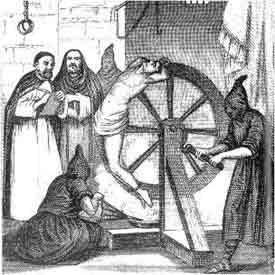
Manipulation of Belief Systems
When the Spanish Inquisition started it was a concentrated attempt to eradicate the practice of the Jewish faith in Spain. “On September 27, 1480, the Spanish saw Prince Ferdinand and Isabella issued an order to establish and their kingdom tribunals to judge cases of “heretical depravity,” and shortly thereafter, probably in November, they set up in Seville the first of these tribunals, become known collectively as the Spanish inquisition. The royal Decree explicitly stated that the inquisition was instituted to search out and punish converts from Judaism the trend stressed against Christianity by secretly adhering to Jewish practices and performing rights in ceremonies of the Jews.” (Netanyahu 3) As time went by, the definition of what represented a transgression against the official faith grew into any action that did not fit into a narrow view of what was proper. Any religious practice outside the official religion, including competing forms of Christianity, was considered heresy. It was forbidden to read any text or follow the beliefs that were counter to the Crown’s interpretation of Christianity, such action was seen as a challenge to the power structure of the church and government. A violation of this prohibition often meant a painful death to the transgressor. It is not known how many people lost their lives in the three centuries the Inquisition existed across Europe and their colonies.
Besides religion, there are examples of governmental systems being manipulated by limiting access to information to control the general population. Prior to the Russian Revolution Czar Nicolas outlawed the study of Philosophy at public universities, similar to the prohibition imposed many years later against teaching evolution. In this instance the fear was these works would cause revolutionary thoughts on impressionable university students. Which in a sense was true, the introduction of conflicting ideologies did help fuel the revolution. Since it was prohibited to publicly discuss the topics, there was no way for the existing government to challenge the introduction of new ideas, except by force. After the revolution in 1917, the new government started an aggressive literacy program. At the same time it keep tight control on the allowable books the citizens had access to and a campaign began which banned books that were inconsistent with the new way of thinking. The challenge for any revolutionary force is that they do not use the same tactic as the power being challenged. Too often, the “true and correct” way of thinking is just replaced with a different “true and correct” way of thinking.
This paper is not claiming that every book ever printed is worth paper or electronic space used to produce it. There is a vast list of books which I consider to be vile and actively encourage people not to read them. But, that is different from supporting the banning of the books altogether. By placing a prohibition on the books the authority is saying, you are not to be trusted to figure out if this book is worthy of reading or not, therefore I will decide for you. I have no problem debating/discussing the value of a book, because there is fundamental respect for the right to choose. The main reason the title for this article was selected can be attributed to the notion that a society cannot have a freedom and liberty stemming from ignorance due to a denial of access to information. If the masses are working from a position of ignorance and their existence is manipulated by those with the power, they cannot make rational, informed decisions. Instead of pacifying the population is creating an environment of discontent and revolution.
Another tactic of control is to limit the degree to which the population is able understand the written word. In the United States, when slavery was still legal and tolerated, there were many states that prohibited the teaching of slaves in the art of reading and/or writing. The following is an excerpt from Virginia Revised Code of 1819
That all meetings or assemblages of slaves, or free negroes or mulattoes mixing and associating with such slaves at any meeting-house or houses, &c., in the night; or at any SCHOOL OR SCHOOLS for teaching them READING OR “WRITING, either in the day or night, under whatsoever pretext, shall be deemed and considered an UNLAWFUL ASSEMBLY; and any justice of a county, &c., wherein such assemblage shall be, either from his own knowledge or the information of others, of such unlawful assemblage, &c., may issue his warrant, directed to any sworn officer or officers, authorizing him or them to enter the house or houses where such unlawful assemblages, &c., may be, for the purpose of apprehending or dispersing such slaves, and to inflict corporal punishment on the offender or offenders, at the discretion of any justice of the peace, not exceeding twenty lashes.” (PBS)
Since that period of time the literacy rate for the United States has risen significantly for all stratification of the social structure. According to the Institute of Educational Science (IES), in 2003, 88% all Americans 16 years and older had some skills of document literacy. However, in our recent history there are some disheartening trends taking place. According to the NationalCenter for Educational Statistics, between 1992 and 2003 the level of Americans whose literacy level is below basic has increased. For example, those individuals with some high school education in 1992, 45% had a reading comprehension and writing capability of below basic, for that same group the level raised to 50% in 2003. In 1992, 2% of all college graduates had a literacy rating of below basic that number rose to 4% in 2003. (IES) As a nation, our reading comprehension is on the decline. But still the literacy rate is still amongst the highest is the world. Even with a high literacy rate, it does not mean that people who can read are actively engaged in the process of thinking.
With current saturation of twenty four hour news sources the critical thinking skills appear to be diminishing. People are becoming dependent on single sources of information to form their worldview. There is a song performed by John Mayer that expresses the frustration of a generation trying to figure out the truth in a society obsessed with fabricated sound bites. Those who have to rely on the media because of the lack of ability or choose only to listen to once ideological view point.
“When you trust your television
What you get is what you got 'cause when they own the information ooohhh,
They can bend it all they want!” (Mayer)
The point Mr. Meyer is trying to make is, if you rely on only one sources of information, then the possibility of being deceived increases, because you are allowing someone else to do the thinking for you. By getting information from difference sources does not mean watching Fox News, and then listening to Rush Limbaugh show as a counter perspective or going to MSNBC and then use Bill Maher to challenge the information. By solely using people from the same school of thought you do not have a view from a different perspective. The trick is to get the information from sources that challenge each other, and then apply reason to the information. Rational thinking is where the real challenge exists.
Figure 5
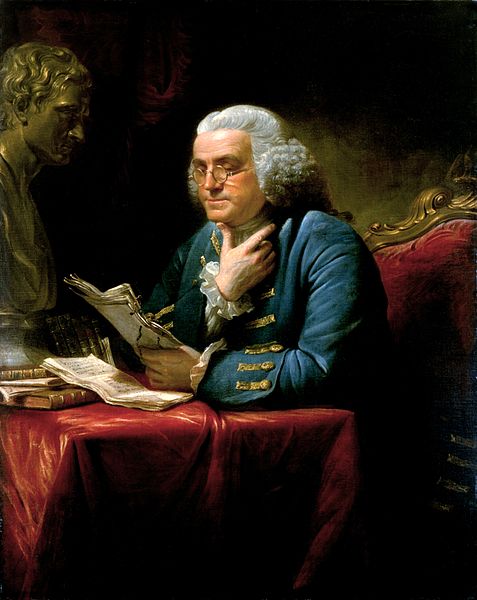
Reading and Reason
Several key figures of the American Revolution wrote about the importance of reading. In his autobiography, Benjamin Franklin reflects on his life time love of reading and his need to be exposed to other ideas.
“From a Child I was fond of reading, and all the little Money that came into my hands was ever laid out in books. …….. My father’s little library consisted chiefly of books in polemic divinity, most of which I read, and have since often regretted that, at a time when I had such a thirst for knowledge, more proper books had not fallen in my way since it was now resolved I should not be a clergyman. Plutarch’s Lives there was in which I read abundantly, and I still think that time spent to great advantage. There was also a book of De Foe’s, called an Essay on Projects, and another of Dr.Mather’s, called Essays to do Good, which perhaps gave me a turn of thinking that had an influence on some of the principal future events of my life.” (Franklin 13)
Another example of a how important reading was to our Founding Father can be found in a 24 August, 1819, letter to John Brazer, from Thomas Jefferson. Jefferson was giving justification why he thought people should study the classics. For different professions he highlights reasons for studying. I am drawing attention to one group in particular. “The statesman will find in these languages history, politics, mathematics, ethics, eloquence, love of country, to which he must add the sciences of his own day, for which of them should be unknown to him? And all the sciences must recur to the classical languages for the etymon, and sound understanding of their fundamental terms. For the merchant I should not say that the languages are a necessary. Ethics, mathematics, geography, political economy, history, seem to constitute the immediate foundations of his calling. The agriculturist needs ethics, mathematics, chemistry and natural philosophy.” (Jefferson) He believed that a steady diet of reading, especially at a younger age was essential to future success and the production of able bodied leaders. Franklin, Jefferson and the rest of the bandits that made up the Founding Fathers (and Mothers) were educated and well read. They were reading and at times writing the new treatise that was challenging the existing power structure.
However the British philosopher John Locke warns us that reading, even from multiple sources is not enough. “This is that which I think great readers are apt to be mistaken in. Those who have read of everything are thought to understand everything too; but it is not always so. Reading furnishes the mind only with materials of knowledge; it is thinking makes what we read ours.” (Locke ) The ability to reason or think through the material is essential for comprehension and the application the information to life. In his treatise Of the Conduct of the Understanding, Locke elaborates on the “miscarriages” people are guilty when they try to apply reason to any situation.
"(i) The first is of those who seldom reason at all, but do and think according to the example of others, whether parents, neighbors, ministers or who else they are pleased to make choice of to have an implicit faith in for the saving of themselves the pains and trouble of thinking and examining for themselves.
(ii) The second is of those who put passion in the place of reason and, being resolved that shall govern their actions and arguments, neither use their own nor hearken to other people's reason any further than it suits their humour, interest or party; and these, one may observe, commonly content themselves with words which have no distinct ideas to them, though in other matters that they come with an unbiased indifference to they want not abilities to talk and hear reason, where they have no secret inclination that hinders them from being tractable to it.
(iii) The third sort is of those who readily and sincerely follow reason but, for want of having that which one may call large, sound, roundabout sense, have not a full view of all that relates to the question and may be of moment to decide it. We are all shortsighted and very often see but one side of a matter; our views are not extended to all that has a connection with it. From this defect I think no man is free. " (Locke)
His concerns can be simplified to 1) people do not think for themselves, 2) they allow only emotion to rule their action, and/or 3) they do not have enough information to base their action on. These three attacks on reason are as true today as they were when he penned them. The majority of Americans, tend to rely on what is told to them, which fits into their preconceived notion of the world, rather than challenge what is told to them with research and questioning.
Figure 6
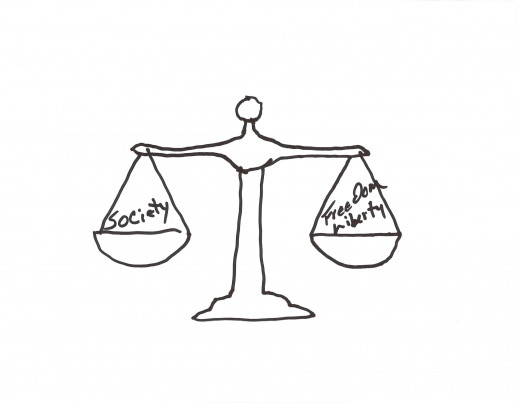
Freedom and Liberty
The motivation behind the prohibitions against reading discussed throughout this article was to curb the questioning of the status quo and the search for a different way of living. The status quo respects and strives towards stability for the existing power structure. In her book, Dr. Nafisi explains the prohibition through a quote she attributes to Vadimir Nabokov, “curiosity is insubordination in its purest form” (Nafisi 45) Reading and comprehension require thinking and often challenging the established framework, which creates a disruption in the routine application of the power.
A key component of freedom and liberty is the ability to publicly challenge the existing conditions. Through reading, reasoning and public discourse, the individual is able to formulate their own opinion. The American philosopher Erich Fromm wrote in his book, On Disobedience: Why Freedom Means Saying No To Power, “Obedience to a person, institution or power (heteronomous obedience) is submission; it implies the abdication of my autonomy and the acceptance of a foreign will or judgment in place of my own. Obedience to my own reason or conviction (autonomous obedience) is not an act of submission but one of affirmation. My conviction and my judgment, if authentically mine, are a part of me.”(Fromm 8) Fromm was not advocating chaos or anarchy; rather he was saying to be free means taking an active role in the development and application of a belief system. Without the ability reasoning by the general citizenry, even with revolution, there will be no freedom or liberty.
Reading and comprehension are arts forms that take practice to actively pursue. The frustrating part is that it is an endeavor one can never really perfect. It is a time consuming and mentally exhausting task to maintain because as new information comes the understanding of how the world works change. If there is no challenge then there is no growth for the individual or the society. The trick is the balancing act between expression of difference, individual rights, and the maintenance of a society.
References
EndNote
1. In 1960, a movie based on the play was released starring Spencer Tracy, as Harry Drummond and Fredric March, who played Matthew Harrison Brady.
2. Dr. Nafisi did not use real name in her book because she feared that they would be retaliated against.
Bibliography
Institute of Educational Science (IES). NationalCenter for Educational Statistics. Educational Indicators for the White House Social Studies Briefing Room: Adult Literacy. http://nces.ed.gov/ssbr/pages/adultliteracy.asp?IndID=32. (Accessed May 18, 2013)
Franklin, Benjamin. The Autobiography and Other Writings. Penguin Books. 1986
Fromm, Erich. On Disobedience: Why Freedom Means Saying No To Power. Harper Perennial Modern Thought. New York. 2010
Jameson, Antony. Department of Aeronautics & AstronauticsStanfordUniversity. A Short History of Russia (to about 1970). http://aero-comlab.stanford.edu/jameson/world_history/A_Short_History_of_Russia.pdf. 03-Apr-2008. (Accessed May 19, 2013)
Jefferson, Thomas. Hampden-SydneyCollege. Thomas Jefferson on Why Study Classics. http://www.hsc.edu/Academics/Academic-Majors/Classics/Why-Classics/Thomas-Jefferson-on-Why-Classics.html. 1819. (Accessed May 19, 2013)
Lawrence, Jerome and Robert E. Lee. Inherit the Wind. Ballantine Books. New York. 1955
Locke, John. Of the Conduct of the Understanding. http://www.ilt.columbia.edu/publications/cesdigital/locke/conduct/toc.html. 1762. (Accessed May 19, 2013)
Nafisi, Azar Reading Lolita in Tehran: A Memoir in Books. Random House, New York. 2004
Netanyahu, B. The Origins of the Inquisition in Fifteenth Century Spain. Random House. Toronto, Canada. 1995
Mayer, John. Waiting on the World to Change. Album Continuum. Sony. 2006
PBS. The Slave Experience: Education, Arts, and Culture: Original Documents. http://www.pbs.org/wnet/slavery/experience/education/docs1.html. 2004. (Accessed May 19, 2013)
University of Missouri-Kansas City School of Law. http://law2.umkc.edu/faculty/projects/ftrials/scopes/scopes.htm. Last update 4/25/2008. (accessed May 18, 2013)
Images
Figure 1: One Corner of My Library Taken on May 15, 2013
Figure 2: Library of Congress: Clarence Darrow at the Scopes evolution trial, Dayton, Tennessee, July 1925. http://www.loc.gov/pictures/item/97512300/. (accessed May 19, 2013)
Figure 3:Daugherty.William J.https://www.cia.gov/library/center-for-the-study-of-intelligence/csi-publications/csi-studies/studies/spring98/photoa.gif https://www.cia.gov/library/center-for-the-study-of-intelligence/csi-publications/csi-studies/studies/spring98/iran.html Figure 4: Composite engraving from Dr. Southwell's "New Book of Martyrs." Freeman, Shanna. The Beginnings of the Spanish Inquisition. http://history.howstuffworks.com/historical-figures/spanish-inquisition1.htm. (Accessed May 19, 2013)
Figure 5: Martin, David (artist). The White House Historical Association. Portrait of Benjamin Franklin. http://www.whitehouseresearch.org/assetbank-whha/action/viewAsset?id=153. (Accessed May 19, 2013)
Figure 6: The Balancing Act. Artist Mark Monroe
© 2013 Mark Monroe



